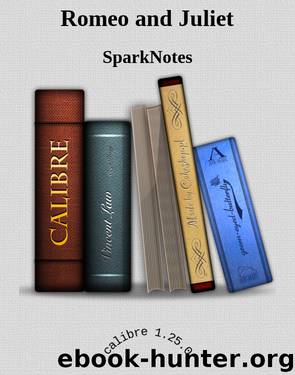Romeo and Juliet by SparkNotes

Author:SparkNotes [SparkNotes]
Language: eng
Format: epub
Published: 0101-01-01T00:00:00+00:00
(See Important Quotations Explained)
Analysis: Act 2, prologue–scene 1
The prologue to the second act reinforces themes that have already appeared. One love has been replaced by another through the enchanting power of the “charm of looks,” and the force of parental influence stands in the way of the lovers’ happiness. This prologue functions less as the voice of fate than the first one does. Instead it builds suspense by laying out the problem of the two lovers and hinting that there may be some way to overcome it: “But passion lends them power, time means, to meet, / Temp’ring extremities with extreme sweet” (2.Prologue.13–14).
Act 2 is the happiest and least tragic act in the play. In it, Shakespeare devotes himself to exploring the positive, joyful, and romantic aspects of young love. Scene 1, the balcony scene (so called because it is often staged with Juliet on a balcony, though the stage directions suggest only that she is at a window above Romeo), is one of the most famous scenes in all of theater, owing to its beautiful and evocative poetry. Shakespeare plumbs the depths of the young lovers’ characters, and captures the subtleties of their interaction, as in Juliet’s struggle between the need for caution and an overpowering desire to be with Romeo.
Many of the most important scenes in Romeo and Juliet, such as the balcony scene, take place either very late at night or very early in the morning, since Shakespeare must use the full length of each day in order to compress the action of the play into just four days. Shakespeare exploits the transition between day and night with a recurring light/dark motif, sometimes drawing a sharp distinction between night and day, at other times blurring the boundaries between them. Romeo’s long, impassioned description of Juliet in the balcony scene is an example of this theme. Romeo imagines that Juliet is the sun, rising from the east to banish the night; in effect, he says that she is transforming night into day.
Romeo is of course speaking metaphorically here; Juliet is not the sun, and it is still night in the orchard. But Romeo states the comparison with such devotion that it should be clear to the audience that, for him, it is no simple metaphor. For Romeo, Juliet is the sun, and it is no longer night. Here is an example of the power of language to briefly transform the world, in the service of love.
And yet, in the same speech, Romeo and Juliet also question the power of language. Wishing that Romeo were not the son of her father’s enemy, Juliet says:
’Tis but thy name that is my enemy.
Thou art thyself, though not a Montague.
What’s Montague? It is nor hand, nor foot,
Nor arm, nor face, nor any other part
Belonging to a man. O, be some other name!
What’s in a name? That which we call a rose
By any other word would smell as sweet.
(2.1.80–86)
Download
This site does not store any files on its server. We only index and link to content provided by other sites. Please contact the content providers to delete copyright contents if any and email us, we'll remove relevant links or contents immediately.
4 3 2 1: A Novel by Paul Auster(12358)
The handmaid's tale by Margaret Atwood(7735)
Giovanni's Room by James Baldwin(7307)
Asking the Right Questions: A Guide to Critical Thinking by M. Neil Browne & Stuart M. Keeley(5745)
Big Magic: Creative Living Beyond Fear by Elizabeth Gilbert(5731)
Ego Is the Enemy by Ryan Holiday(5398)
The Body: A Guide for Occupants by Bill Bryson(5067)
On Writing A Memoir of the Craft by Stephen King(4921)
Ken Follett - World without end by Ken Follett(4711)
Adulting by Kelly Williams Brown(4556)
Bluets by Maggie Nelson(4536)
Eat That Frog! by Brian Tracy(4503)
Guilty Pleasures by Laurell K Hamilton(4428)
The Poetry of Pablo Neruda by Pablo Neruda(4083)
Alive: The Story of the Andes Survivors by Piers Paul Read(4013)
White Noise - A Novel by Don DeLillo(3994)
Fingerprints of the Gods by Graham Hancock(3980)
The Book of Joy by Dalai Lama(3963)
The Bookshop by Penelope Fitzgerald(3829)
